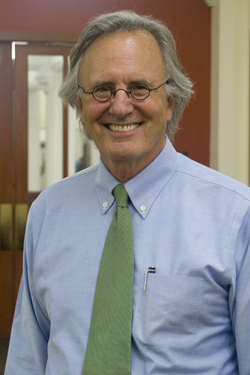Toward an Education Bill of Rights
Toward an Education Bill of Rights
Sitting in the cafeteria of a public elementary school in a working class district of Portland, Oregon, Peter W. Cookson, Jr. witnessed something he couldn’t forget.
Many of the children taking items from the snack cart were returning again and again for more. “Watching this scene, it struck me that that these kids were hungry -- really hungry,” said Cookson, founder of the Washington, D.C.-based consulting firm, Ideas without Borders, and a former TC faculty member, told an audience at the College’s Gottesman Libraries in September.
Out of that moment grew Cookson’s new book, Sacred Trust: A Children's Education Bill of Rights (Corwin Press, 2011), which shines a harsh light on just how vitriolic and beside the point much of the debate about public education has become in recent years and offers a blueprint for a public education system geared to children in need.
Sacred Trust outlines 10 fundamental rights and needs – beginning with a child’s right to a neighborhood public school funded for excellence -- that establish a framework for how children should learn; how best to prepare and support teachers; and how to identify the right model for the 21st century classroom. Other rights specified in Sacred Trust range from the right to curriculum based on relevance and flexibility to an educational trust fund for every child.
These rights are “practical, basic and economically sustainable,” Cookson said.
Cookson, who has also served as Dean of Education at Lewis & Clark College, views his book as a conversation-starter that aims to shift the focus away from ideological and point parents, teachers, grassroots community organizations and local businesses toward a systemic way of better connecting to public schools. In the book’s foreword, Rudy Crew, former public schools chief in both New York City and Miami-Dade County and now a professor at the University of Southern California, calls Sacred Trust, “a must-read for anyone who wants to go beyond simplistic answers to the deeper work and the less sexy conversations.”
Published Tuesday, Oct. 11, 2011
